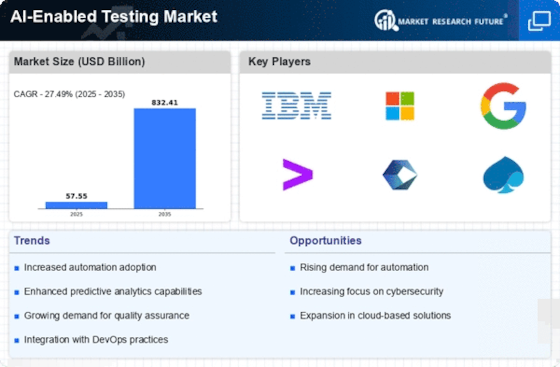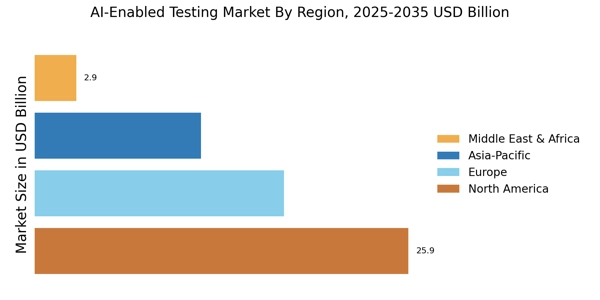Cost Efficiency and Resource Optimization
Cost efficiency remains a critical driver for the AI-Enabled Testing Market. Organizations are increasingly looking for ways to optimize their testing processes while minimizing expenses. AI-enabled testing solutions can significantly reduce the time and resources required for testing, leading to lower operational costs. By automating repetitive tasks and leveraging predictive analytics, businesses can allocate their resources more effectively. Reports indicate that companies utilizing AI in their testing processes can achieve up to 30% cost savings. This potential for cost reduction is likely to attract more organizations to invest in AI-enabled testing solutions, further fueling the market's growth.
Rising Complexity of Software Applications
As software applications become increasingly complex, the AI-Enabled Testing Market is poised for growth. Modern applications often integrate multiple technologies, platforms, and devices, which complicates the testing process. Traditional testing methods may struggle to keep pace with this complexity, leading to a demand for AI-driven solutions that can automate and streamline testing efforts. The ability of AI to analyze vast amounts of data and identify patterns enhances the efficiency of testing processes. This complexity is expected to drive the adoption of AI-enabled testing tools, as organizations seek to ensure that their applications function seamlessly across diverse environments.
Growing Demand for Software Quality Assurance
The AI-Enabled Testing Market is experiencing a surge in demand for software quality assurance as organizations increasingly recognize the importance of delivering high-quality products. With the proliferation of software applications across various sectors, the need for rigorous testing has become paramount. According to industry estimates, the software testing market is projected to reach USD 60 billion by 2025, driven by the necessity for enhanced quality and performance. AI-enabled testing solutions facilitate faster and more accurate testing processes, thereby reducing time-to-market and improving customer satisfaction. This growing emphasis on quality assurance is likely to propel the AI-Enabled Testing Market forward, as businesses seek innovative solutions to meet their testing needs.
Emergence of Advanced Analytics and Machine Learning
The emergence of advanced analytics and machine learning technologies is reshaping the AI-Enabled Testing Market. These technologies enable organizations to gain deeper insights into their testing processes, allowing for more informed decision-making. By leveraging machine learning algorithms, businesses can predict potential issues and optimize their testing strategies accordingly. The integration of advanced analytics into testing frameworks enhances the ability to identify defects early in the development cycle, reducing the overall cost of quality. As organizations increasingly recognize the value of data-driven testing approaches, the demand for AI-enabled testing solutions is likely to grow, further propelling the market.
Increased Focus on Continuous Integration and Delivery
The shift towards continuous integration and delivery (CI/CD) practices is a notable trend influencing the AI-Enabled Testing Market. As organizations adopt agile methodologies, the need for rapid and reliable testing becomes critical. AI-enabled testing tools can seamlessly integrate into CI/CD pipelines, providing real-time feedback and ensuring that code changes do not introduce defects. This integration enhances the overall development process, allowing teams to deliver high-quality software at a faster pace. The growing emphasis on CI/CD is expected to drive the demand for AI-enabled testing solutions, as businesses strive to maintain competitive advantages in a fast-evolving market.

















